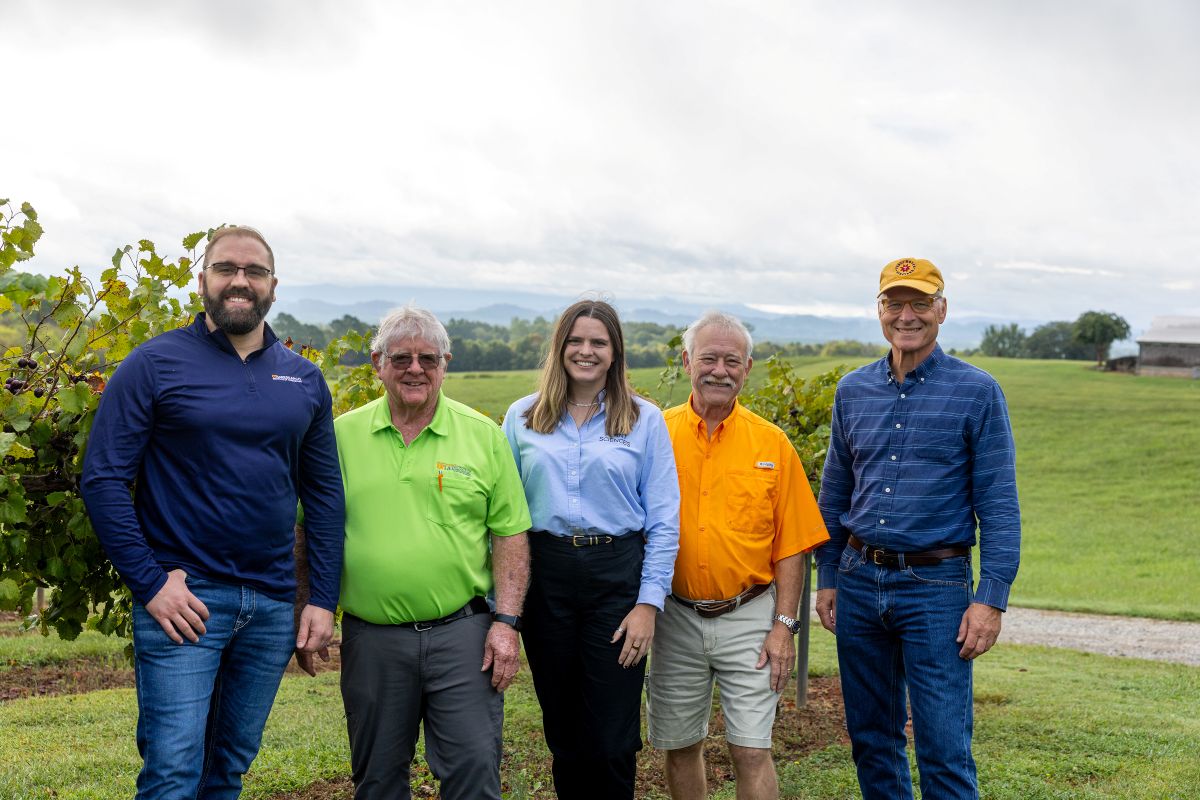
Expanded Team to Serve Tennessee’s Growing Grape and Wine Industries
KNOXVILLE, Tenn. – Tennessee’s grape growers and wineries continue to grow in number, and the University of Tennessee Institute of Agriculture is introducing a new and expanded team of professionals to serve this increasingly important part of agriculture in the Volunteer State.
“Viticulture and enology have tremendous potential for the state of Tennessee in agricultural production, commercial sales and tourism,” says Keith Carver, UTIA senior vice chancellor and senior vice president. “We want to see these industries thrive and grow.”
Grape and wine production takes place across the state. Twenty-nine of Tennessee’s 95 counties had at least one winery in the fourth quarter of 2024, and Tennessee grape-growing farms numbered 472 in 2022.
The two industries have big economic impacts, not only through their operations, but also as popular agritourism destinations. An analysis by UTIA agricultural economists found that when tourism spending is included, the overall economic impact of the Tennessee wine industry on the state economy in 2024 was approximately $610 million, involving more than 3,340 jobs. This includes tax revenues that provided approximately $62 million to benefit local and state budgets. These results highlight the large and growing contribution of Tennessee wineries to the entire Tennessee economy and to local and state tax revenues.
Within the UT Department of Plant Sciences, two new faculty members will build on the outstanding legacy of Extension fruit and nut crops specialist David Lockwood, who helped establish commercial grape growing and winemaking in the state and has served Tennessee fruit and nut growers for 50 years. The team expects to gain a third member in January 2026 with the hire of the university’s first fermentation sciences faculty in the UT Department of Food Science. Meanwhile, Lockwood, too, continues being involved with the team.
Pierre Davadant is the new assistant professor of viticulture at UT, with a 75% appointment in AgResearch and a 25% teaching appointment in the Herbert College of Agriculture. His position was created to focus on Tennessee’s expanding interest in grapes and wines. Davadant’s research will focus on identifying grape varieties adapted to Tennessee’s climate and developing vineyard practices that reduce frost risk, control fungal diseases, manage vine vigor and improve fruit and wine quality. A central part of his vision is to understand how climate, soils and growing conditions shape the identity of local wines across East, Middle, and West Tennessee. For the first time ever, students with an interest in viticulture will be able to take a course entirely related to grape production.
Originally from France, Davadant earned master’s degrees from two French universities: a degree in agriculture from École d’Ingénieurs de Purpan and in viticulture and enology from SupAgro in Montpellier. He completed a Ph.D. at Washington State University, where he studied grapevine nitrogen nutrition. He has worked at leading wine estates in France and California and spent six years teaching in France. At UT, he will combine research in field trials, controlled experiments, and create a UT test vineyard to help Tennessee growers produce high-quality wines as well as develop new viticulture classes for our students.
Annie Vogel is a new assistant professor and UT Extension commercial fruit specialist, covering grapes along with other fruit crops. She has statewide responsibilities for developing a comprehensive educational program in commercial fruit production and provides a vital link between researchers and growers. Her Extension program will include production and management recommendations, adapting management strategies to regional climates, diversifying crops and encouraging integrated pest management strategies through a horticultural lens.
Having focused on grapes for her bachelor’s and master’s degrees from the University of Georgia, Vogel is well-acquainted with viticulture. Her background in fruit production began when she was a summer intern at a vineyard in west Georgia. As a research assistant in the university’s viticulture program, Vogel helped maintain research projects across 11 north Georgia vineyards, growing bunch grapes and muscadines. Her master’s thesis explored leaf removal, a common canopy management practice, to determine the ideal timing and extent of leaf removal to improve or maintain fruit quality, yield, and disease management in southeastern vineyards. Vogel also built a model to predict grape berry temperature using modified, self-contained data loggers to determine berry temperature in varying canopies.
In his post-retirement role, Lockwood continues to support Tennessee grape and wine producers through Extension outreach, education, and technical assistance, working closely with Vogel to ensure a smooth transition and continuity of service for growers.
To reach team members, email Davadant at pierre.davadant@utk.edu, Vogel at avogel8@utk.edu and Lockwood at lockwood@utk.edu.
The University of Tennessee Institute of Agriculture is comprised of the Herbert College of Agriculture, UT College of Veterinary Medicine, UT AgResearch and UT Extension. Through its land-grant mission of teaching, research and outreach, the Institute touches lives and provides Real. Life. Solutions. to Tennesseans and beyond. utia.tennessee.edu.